Mercenaries Review
It may be top of the charts, but is it really the GTA-killer it's billed as?
Let's face it, who needs a convincing plot, character development and an interesting environment when you can "blow stuff up", "blow the living hell out of it" and "blow the living hell out of it some more"? LucasArts is quite happy to try and appeal to our basest destructive instincts and hope that amongst the rubble we don't mind or don't care that there's very little of substance holding Mercenaries together. And, given that it has just hit the Number One spot in the UK charts, we're guessing you're all quite happy to be manipulated.
Pandemic's Grand Theft Also is undoubtedly of exceptionally high quality in almost every technical respect you could imagine. The most worrying aspect, though, is how hard it is to get into it in the first place and how little you'll care for any of it even when the missions do become more enjoyable. Presented with a (basically finished) preview build a couple of months back we messed around with it for an hour or so doing the first handful of jobs and just exploring the map. But although we could instantly see why it had generated plenty of attention, we had a strange lack of compulsion to return. When it came to review stage there was an air of obligation, and that's never a good sign. Normally we'd be fighting for the decent games in the early barren months of the year but Mercenaries initially left us colder than the pedestrians shivering their way to work through the snow outside as this was scribed.
Sing us a Song
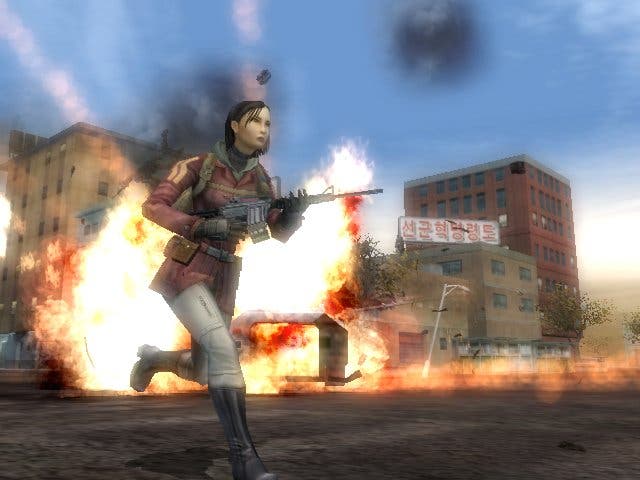
Dodgy political machinations aside, the setting is held together by the premise that the peaceful reunification of North and South Korea has been scuppered by the warmongering General Song and has escalated to a full blown conflict which is threatening to snowball into a full-blown global crisis. But keen to keep the situation out of the press you're employed as an ExOps Mercenary to systematically dismantle Song's evil war machine piece by piece. Dirty money for dirty deeds.
After choosing one of three fairly faceless ExOps grunts you're thrust into the war-torn rural environment to take jobs initially with the upstanding Allies, but then find yourself having to do some dirty work for the Chinese, South Koreans or Russians in order to gather the necessary intel on Song's Deck of 52. Split into four suits, this neat and innovative structure essentially places the number cards as the easy pickings, the picture cards as the real meat while the Ace effectively acts as each 'level's' boss.
Sometimes intel on the Deck of 52 crops up as a direct result of completing one of the missions, and it's left up to study the emails you get and follow the trail of clues as to their whereabouts. But, in true sandbox style, it's very much left up to the player as to when you decide to nail them dead or alive. You can keep taking the jobs and building up the cash if you so choose, but eventually to progress you're going to need roughly half of the total intel/personnel before you're whisked off to a separate location to finally take down the Ace.
Guns and Poses
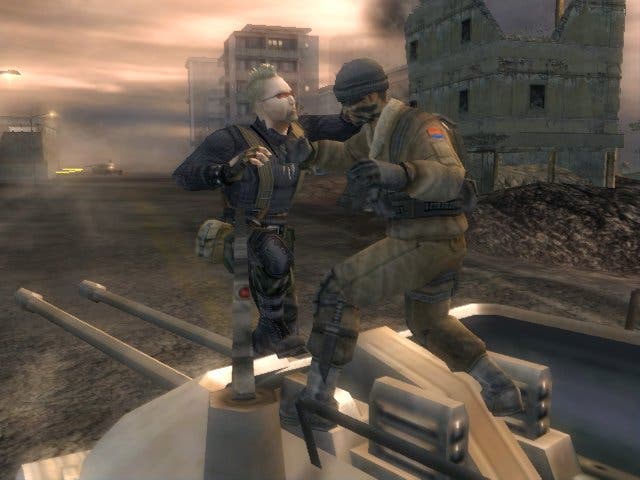
The core of the game's appeal remains in its relentless appetite for destruction. Almost every mission adheres to the same basic principle of 'go in, kill everything that moves, blow everything up that's standing, and if it's not, blow it up anyway'. Blessed with probably the best in-game physics ever seen in a console game, Pandemic has effectively built a world, asked you to systematically destroy it brick by brick, and then handed you a Rocket Propelled Grenade. And a Stealth Bomber. And Gunship Support. And a Cruise Missile. And practically every destructive piece of weaponry you could dare to imagine. And then it smiles with you as the fireworks go off.
As a spectacle it really is something else. As you steady your aim with an anti aircraft rocket in hand to try and take down that pesky chopper that's been circling you and raking you with fire for the past minute or so, you're initially surprised to see how skilfully they avoid your rockets of death. But when they don't take the hint and come back for more, the determination to get rid of them once and for all keeps growing until... finally! You make full, satisfying contact with its underside and send it spinning through the air in a beautiful arc of flaming, twisted, smoking death. But to then see the pilot of the bloody thing propelled towards you in the explosion and land with a 'thunk' nearby probably lets us know what we're dealing with. It's war.
You could follow up that observation with any number of individual moments of recollection about the individual missions, and we're sure the forums will be alive with blow by blow accounts of individual journeys, of the equipment you're best to tool yourself up with beforehand, the vehicles to use and the paths to take. Mercenaries, at its visceral best, is alive with possibilities, with a vast number of ways of achieving success in individual missions. One brutal mission which held us up for ages in the second suit had us struggling away manfully on foot before it suddenly occurred to us we could just as easily ponce an SK chopper en-route and bypass much of the hassle; only to inevitably get blasted from the sky by anti aircraft defences. It's that sort of game; Pandemic is always thinking one step ahead of you, and you can't help but start to really love the game for that once the challenge really kicks in.
The hills are alive with celibate cries
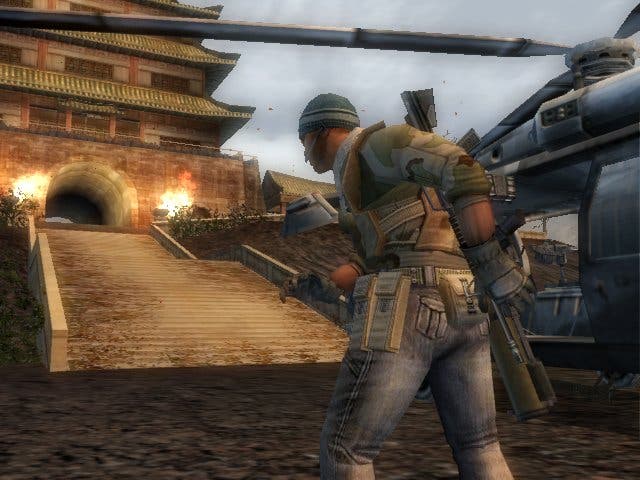
But to get to that stage takes a lot longer than it should. The first two to three hours are full of ho-hum missions that provide little challenge and don't show off the game in its best light at all. It's really at this point you wonder if you'll really care about what's going on. There doesn't seem to be anything especially interesting going on in terms of the plot, the briefings are consistently pedestrian, you won't care two hoots about the characters and in truth the actual environment is largely bereft of anything interesting in it. If the GTA games were alive with possibility and secrets, Mercenaries is alive with hills, but, sigh, those hills are not alive with the sound of gunfire. As much as the game works by placing the gamer in a sandbox environment in theory, it lets itself down time and again by making the journeys across the map as dull as hell. Several times we really had to fight to continue, having to constantly tell ourselves that the journey would be worth it once we got another mission on the go. It usually was, thankfully, but often the sheer tedium of driving around looking for a mystery member of the Deck of 52 was something we would have happily removed from the game.
And what's with the Deck of 52 members anyway? We've mentioned the complete lack of story intrigue elsewhere, but these guys are little more than cardboard cut outs designed to hold up your progress. Sure, the fight to get to them is often fantastic, but then to be able to wander up to them, stun them and cuff them without any semblance of a fight is hugely anticlimactic. Instead of being a series of colourful boss encounters, it's no more than a mini-battle followed by a swift and effortless takedown. So much more could have been made of these encounters and frankly it's symptomatic of the game's hollow feel; as if it's all about the action and nothing more.
We should take time to applaud several elements of the game, though. After the often harrowing experience that was 103 missions of San Andreas, it's a joy to find that Pandemic has recognised that allowing you to restart a contract/mission in progress is far preferable than continually being booted back to the hospital, or forced to reload a saved game that may actually be ages away from the start of a mission. In Mercenaries, if you fail, that's fine, just restart fully equipped with no hassle at all. They know full well the real hassle will be in the mission itself, so we should be thankful for Mercenaries' small mercies.
Joy unto all men
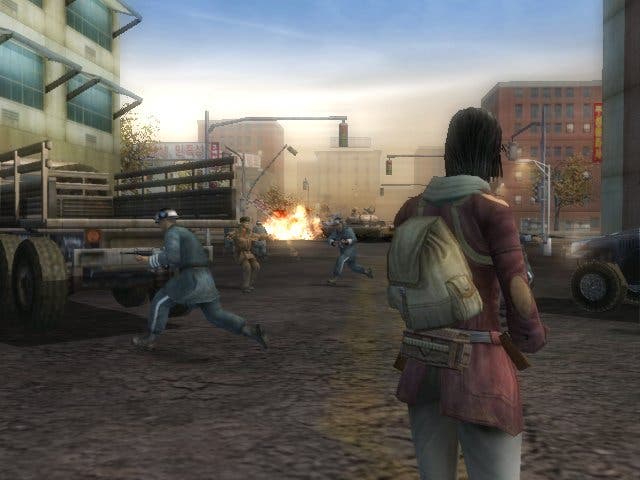
Another area that Pandemic has nailed far better than any GTA-style game we've come across is actual proper two-stick third-person controls. Glory be! A third-person action game that allows you to control it like a third-person action game, meaning left stick for movement, right for camera control. Glory hallelujah! And as a result you spend much less of your time cursing the stupid controls that are busy trying to wrestle the camera angle off you, and more time nailing endless amounts of cannon fodder, which is a comparative breeze. Thank you Pandemic.
A special mention, too, of how Mercenaries seamlessly deals with delivering the player supplies, vehicles, and special weapons. Instead of forcing you to go through hoops visiting ammo shops and picking up vehicles hidden in obscure places, the player can look up the currently unlocked items in the shop menu and - so long as there are sufficient funds in the kitty - have them delivered anywhere at any time, saving one hell of a lot of frustration if you're stuck in the middle of nowhere and your ride's just exploded and your gun's out of ammo. On the flip side, though, having to wait for a chopper to deliver a crate when you're down to 1 health and dodging enemy fire can be a little taxing to say the least. Mysteriously your Merc can recover up to 20 points of his health by simply staying out of harm's way, but some of the splash damage from rockets and so on makes that a distant prospect when things start getting crazy later in the game. It's hard to think of a more graceful health-related solution under the circumstances, but it's tough to make progress when you're being shelled to pieces by enemies as deadly as these.
But that's another story. We've procrastinated about addressing how it looks and sounds. That's probably because we have mixed feelings and don't quite even know if we really like it or not. On the one hand it's a game that oozes with technical polish, with a level of destructibility that's so awesomely well implemented you've probably be seeing new things throughout the entire 60 hours of gameplay, but on the other its overall art style just doesn't instil the wow factor it probably should. In physics terms it's unequalled and finally gives buildings and vehicles a real physical property that no other game we can think of has ever even come close to matching. And even better, buildings that get destroyed stay destroyed - unless we're very much mistaken - forever. This level of persistence is truly impressive, and deserves full marks for pulling off, even if ultimately it doesn't necessarily change how you approach missions.
Eye test
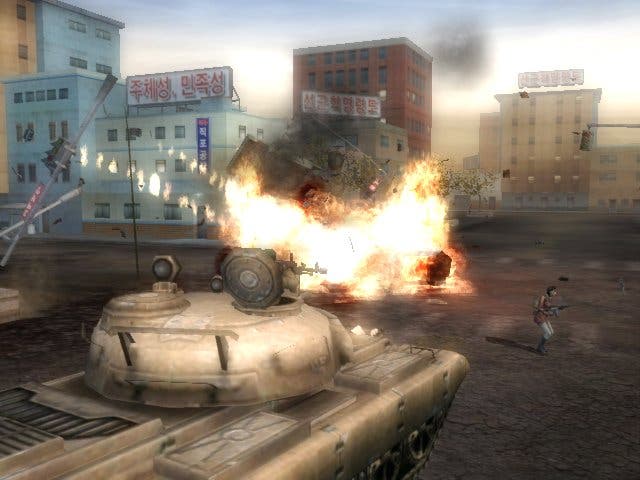
The thing that didn't quite sit with us, though, is the game's tendency to mist everything out to the extent that as soon as you get in the air, you can barely see a damned thing. And even when you're on the ground, this sort of soft focus effect made us want to take our eyeballs out and give them a little buff up to make sure. Stupid exaggerations aside, the extent to which the game world consists of rolling hills and little else makes for a bland sandbox, and no matter how much Pandemic tries to create this sense of battles constantly being fought wherever you go, it doesn't change the fact that probably 90 per cent of the map is redundant to the player. Add to that some fairly anonymous-looking character models and it's a game that you feel could be improved a lot in future incarnations.
On the audio front it's a largely unexciting affair, with a blank wafting soundtrack that does little to stir emotion, and while the voiceovers and one-liners are delivered with assured professionalism from named actors [one of whom Tom took great pride in being able to identify as the guy who played Sig in Jak II and III -Ed], it's a game crying out for a decent script writer and personalities to bring the whole thing to life. Probably the most accurate summation of Mercenaries is that when you're in the thick of a mission it's like you're playing the best action movie, but when you're not it's a boring videogame. This continual glorious suspension of disbelief followed by crushing tedium doesn't sit well with us. In many respects we wish we had less freedom, if only to take advantage of Pandemic's evidently supreme talents for creating great set piece missions. We want to retain the freedom within the missions, just not necessarily the freedom outside of them.
There's too much fat that needs trimming out of Mercenaries for it to warrant the top marks it nearly deserves, but enough good stuff in there for it to be one of those games you assure your mates "honestly, it gets good, just stick with it". For a first stab at this tricky genre Pandemic can feel satisfied that it got the core of the game right, even if it took its eye off the ball elsewhere. Maybe it gets a little too tricky for its own good sometimes, maybe it's just plain dull between missions, but when it gets things right it's a brilliantly enjoyable all-action extravaganza of blockbuster proportions.

